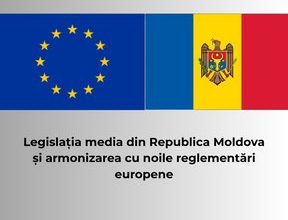Recent Proposals of the Government and the Perspective of the Right of Access to Information

Cristina Durnea,
legal adviser at the SCJ
During the meeting of May 4th, the Government approved a draft law regarding the modification of several normative acts, including the Law on access to information. To dispel possible concerns regarding the effects of this initiative, it is necessary to state that the document has not yet become a law. These proposals can acquire legal force only after the examination and approval of the project by the Parliament, a process that also involves the public consultation of the document.
Until these events occur, let’s analyze what exactly the proposed changes entail and what effects they may have on the right of access to information.
1. The preliminary procedure
Since 2019, when the Administrative Code entered into force, contesting refusals to provide information by the authorities had become a real hassle, both for applicants and for the courts.
Currently, the Law on access to information establishes that the applicant can challenge the provider’s refusal “both extrajudicially and directly before the competent administrative court”. In practice, there have been numerous problems related to the interpretation of this text. More precisely, is the extrajudicial way an alternative left at the disposal of the applicant or, however, is it mandatory to be followed before going to court?
In principle, with the crystallization of jurisprudence on this segment, the magistrates agreed that it is an alternative option and not a mandatory one. In other words, currently, applicants do not have to follow the preliminary procedure before going to court.
Returning to the legislative suggestions of the Government, the Executive proposes to replace the text that provides for addressing “both extrajudicially and directly before the competent administrative court” with the one that provides for the possibility of contesting the provider’s actions “according to the provisions of the Administrative Code”[1].
The administrative code contains several articles regulating the preliminary procedure[2]. The interpretations of the magistrates in relation to these provisions were and continue to be extremely varied. On the one hand, some courts consider that the preliminary procedure must be followed only when special legislative rules (derogating from the Code) provide for this procedure and, on the other hand, other courts consider that compliance with the preliminary procedure is the rule, and the exception intervenes only where special laws expressly “exempt” plaintiffs from this burden. Therefore, many of the actions filed in court by the information requesters were declared inadmissible for failure to comply with the prior procedure, and others – because the requester missed the court deadline, waiting for a response to his prior request from the provider.
An attempt to shed light on this dilemma occurred at the end of 2021, when the Supreme Court of Justice (SCJ) published an Informative Note. The SCJ clearly pointed out that “the prior procedure is mandatory only when the special law expressly provides for it”.
Therefore, in the event of the legislation of the Government’s proposal regarding the preliminary procedure, the applicants will still be able to challenge the refusals from the suppliers directly in court. In other words, the amendment will NOT change the state of affairs in this segment.
However, the issue of divergent interpretation by the courts of those provisions of the Administrative Code that regulate the preliminary procedure remains unsettled. The solution for changing these practices does not result from the amendment of the Law on access to information, but from the adjustment and clarification of the legal norms in the Administrative Code (art. 162-163, art. 208 of the Administrative Code).
2. Deadline for providing the information
Currently, the law provides that “the requested information must be made available to the applicant from the moment it is available to be provided, but no later than 15 working days from the date of registration of the request”. In this sense, the Government’s amendments assume the exclusion of the phrase “from the moment they will be available to be provided[3]. Therefore, if the Executive’s amendments become law, the 15 working day period will remain unchanged.
A major problem, however, is the proposal[4] to extend the deadline for extending the period in which information providers must return with an answer. Currently, the law establishes that the deadline for providing the information (15 days) can be extended by 5 working days if the applicant requested a “very large volume of information that requires their selection” or if “additional consultations are necessary to satisfy the request”. Therefore, the maximum waiting period for a response cannot exceed 20 working days.
On the other hand, the draft law approved by the Government provides for the possibility of extending the standard term (15 days) by up to 30 working days. Thus, in the event of the legislation of this proposal, in some situations, information requesters will be able to hope for an answer after 45 working days.
3. Request for access to information and the requirements of the Administrative Code
Two other proposals contained in the Government’s draft law provide for the obligation of the information requester to comply with the requirements of form and content, provided by the Administrative Code, when formulating and addressing their request[5]. Subsequently, they provide for the provider’s obligation to register and examine information requests in accordance with the provisions of the Code[6].
Since 2019, the process of examination and resolution by public authorities of requests for access to information became applicable, along with the provisions of the Law on access to information, and those of the Administrative Code. The provisions of the Code (general law) apply, insofar as they do not contravene the Law on access to information (normative act of a special character)[7].
Currently, the Law on access to information lists several requirements in relation to requesting information. Specifically, it must contain identification data of the requester, sufficient details to identify the information and the acceptable way of receiving it[8]. In turn, the Administrative Code also provides the same conditions, the only additions being the indication of the “name of the public authority”, the “motivation of the petition” and the “signature”.
Although, for more than 3 years, the national courts have clearly pointed out that the procedure for exercising and capitalizing on the right of access to information falls under the Administrative Code, this fact is still a subject for polemics in the public space.
Therefore, the request for access to information addressed to a public authority must satisfy both the conditions imposed by the special and the general law, with one exception in this respect – “motivation of the petition”. According to the special law[9], the information requester is released from the obligation to justify his/her interest in the requested information. The same rule is established in the Tromsø Convention (“The requester of an official document shall not be obliged to state his/her reasons for obtaining access to the document”).
However hard the fierce critics may argue against this fact (accomplished), a few things remain certain:
• According to the current legislation[10] (as well as the one recalled[11] with the entry into force of the Administrative Code), the request for access to information addressed to a public authority is a petition.
• All electronic documents, including the request for access to information, must be signed electronically[12]. And until the entry into force of the Administrative Code, according to the Law on electronic signature and electronic document, all documents transmitted by electronic means must be duly signed, including requests for access to information[13].
In conclusion, the proposal to amend the law proposed by the Government (“The request must meet the conditions imposed by the provisions of the Administrative Code”) will rather have the role of exhausting uncertainties regarding the applicability of the provisions of the Code, than changing current practices.
4. Request readdressing
The law on access to information provides that the request can be readdressed to another provider when the requested data is not in the possession of the notified provider or “if there is another provider that would more fully satisfy the request”. The redirection can only take place if the supplier has informed the applicant, within 3 working days, about this fact and obtained an agreement from him/her.
In this sense, the draft law approved by the Government comes with the proposal to exclude these provisions from the text of the Law on access to information. Probably the reasoning of this amendment results from the fact that the same institution (of readdressing) is also regulated by the Administrative Code[14]. However, the Code does not establish the authority’s obligation to obtain an agreement from the applicant (petitioner), and the information deadline is 5 working days. Therefore, this proposal is detrimental to information requesters.
5. Unclear aspects
The law on access to information distinguishes between two categories of providers:
1. Central and local public authorities and institutions;
2. Physical and legal persons who, based on the law or the contract with the public authority or public institution, are empowered to manage some public services and collect, select, possess, keep, dispose of official information (“Premier Energy”, “Moldova Gaz” etc.).
The suppliers in the first category are subjects that fall under the scope of the Administrative Code and the “adjustment” of the Law on access to information to its provisions can be justified in this case. On the other hand, guided by the rules of interpretation and application of the law, when we talk about the persons in the second category, only the provisions of the Law on access to information are applicable to them. At the same time, according to the practices of some courts, the disputes filed against the subjects of the second category were tried in the administrative litigation court, and others in the common law court. In other words, some magistrates “assimilated” the legal entities that manage public services with the authorities. Therefore, it remains uncertain whether, when drafting the draft law, the Government took this fact into account.
For many years, civil society has been systemically signaling about problems in the field of access to information. With good reason, in the context of the numerous illegal refusals from the suppliers, the delayed responses or the silence with which the authorities treat the requests of the applicants, access to information in the Republic of Moldova cannot be labeled anything other than “a gimp right”.
Illegal enforcement practices by providers are perpetuated. Courts put the Law on access to information on the list of obsolescence in order to “revive” it later. The international standards that the state has undertaken to respect, as well as the objectives nicely inserted into government programs and action plans, remain for the time being only on paper.
At the epicenter of this drama is, in the vast majority of cases, the press, for which access to information is one of the main work tools. While some amendments in the Government’s draft law do not fundamentally change current practices, others make access to information of public interest even more difficult.
Legislation on access to information cannot become the target of haphazard and uncoordinated changes. The legal framework must be reformed in a consistent way, by adjusting the law to international standards and excluding provisions that generate uneven or erroneous interpretations.
[1][1] Art. VIII, pct. 4 al Proiectului de lege aprobat de Guvern: „La articolul 21 alineatul (1) textul „ataca acțiunile acestuia atât pe cale extrajudiciară, cât și direct în instanța de contencios administrativ competentă” se substituie cu cuvintele „contesta acțiunile acestuia conform prevederilor Codului administrativ nr. 116/2018”;
[2] Art. 162-163 și art. 208 al Codului administrativ;
[3] Art. VIII, pct. 2 al Proiectului de lege aprobat de Guvern: Articolul 16 va avea următoarea redacție: „Articolul 16. Termenele de satisfacere a cererilor de acces la informație (1) Prin derogare de la prevederile Codului administrativ nr. 116/2018, informațiile și documentele solicitate vor fi puse la dispoziția solicitantului în termen de 15 zile de la data înregistrării cererii;
[4] Art. VIII, pct. 2 al Proiectului de lege aprobat de Guvern: Articolul 16, alin. (2) va avea următoarea redacție: Termenul prevăzut la alin (1) poate fi prelungit cu cel mult 30 zile de către conducătorul instituției publice dacă: a) cererea se referă la un volum foarte mare de informații care necesită selectarea lor; b) sunt necesare consultații suplimentare pentru a satisface cererea
[5] Art. VIII, pct. 1 al Proiectului de lege aprobat de Guvern: „La articolul 12 alineatul (2) va avea următorul cuprins: (2) Cererea urmează să îndeplinească condițiile impuse de către prevederile Codului administrativ nr. 116/2018”;
[6] Art. VIII, pct. 1 al Proiectului de lege aprobat de Guvern: La articolul 15 alineatul (1) va avea următorul cuprins: „(1) Cererile cu privire la accesul la informație vor fi înregistrate și examinate în conformitate cu prevederile Codului administrativ nr. 116/2018.”
[7] Art. 5 alin. (3) și art. 7 alin. (3) al Legii privind actele normative: „Normele juridice speciale sunt aplicabile în exclusivitate anumitor categorii de raporturi sociale sau subiecți strict determinați. În caz de divergență între o normă generală şi o normă specială, care se conțin în acte normative de același nivel, se aplică norma specială (…) În cazul în care între două acte normative cu aceeași forță juridică apare un conflict de norme, se aplică prevederile ultimului act normativ adoptat, aprobat sau emis, cu excepția situațiilor prevăzute la art. 5 alin. (3) şi (4)”;
[8] Art. 12 alin. (2) al Legii privind accesul la informație: „(2) Cererea scrisă va conține: a) detalii suficiente şi concludente pentru identificarea informației solicitate (a unei părți sau unor părți ale acesteia); b) modalitatea acceptabilă de primire a informației solicitate; c) date de identificare ale solicitantului”.
[9] Art. 10 alin. (3) al Legii privind accesul la informație: „Orice persoană care solicită acces la informaţii în conformitate cu prezenta lege este absolvită de obligaţia de a-şi justifica interesul pentru informaţiile solicitate”;
[10] Art. 9 alin.(1)-(2) Cod administrativ: „Prin petiție, în sensul prezentului cod, se înțelege orice cerere, sesizare sau propunere adresată unei autorități publice de către o persoană fizică sau juridică”. „Prin cerere se solicită emiterea unui act administrativ individual sau efectuarea unei operațiuni administrative”;
[11] Art. 8 alin. (4) din Legea cu privire la petiționare: „Petițiile (cererile) prin care se solicită o informație oficială se examinează în termenele stabilite în legislația privind accesul la informație”;
Art. 4 alin.(1) din Legea cu privire la petiționare: „Prin petiție, în sensul prezentei legi, se înțelege orice cerere, reclamație, propunere, sesizare, adresată organelor de resort ,inclusiv cererea prealabilă prin care se contestă un act administrativ sau nesoluționarea în termenul stabilit de lege a unei cereri”;
[12] Art. 75 alin. (1), lit. e) al Codului administrativ: „Petiția conține următoarele elemente (…)semnătura petiționarului ori a reprezentantului său legal sau împuternicit, iar în cazul petiției transmise în formă electronică – semnătura electronică”.
[13] Art. 2 din Legea privind semnătura electronică și documentul electronic: „semnătură electronică – date în formă electronică, care sunt atașate la sau logic asociate cu alte date în formă electronică şi care sunt utilizate ca metodă de autentificare”.
[14] Art. 74 al Codului administrativ: „Dacă petiția ține de competența altei autorități publice, originalul petiției se expediază autorității publice competente în termen de 5 zile lucrătoare de la data înregistrării petiției, fapt despre care petiționarul este informat”;




